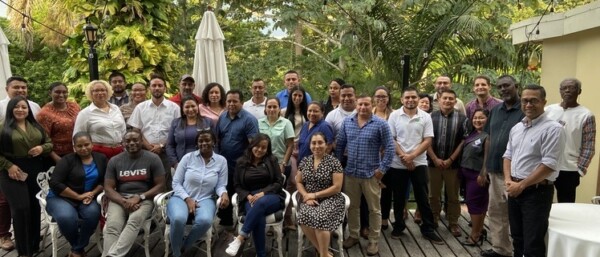
Technical and business advisors in Belize upskilled to help ignite economic growth of agriculture and tourism businesses
Belize has a wealth of natural resources and beauty, however its deteriorating social indicators, high poverty rates and unemployment all contribute to the pressing social and economic challenges. Slow growth has been exacerbated by the impact of the pandemic on the country’s agriculture and tourism industries. Intensifying these conditions, climate and environmental issues are threatening the country’s natural resources and farming systems.
To help the Government of Belize address these challenges, we recently embarked on a project in partnership with the Inter-American Development Bank (IDB) that aimed to enhance incomes and promote sustainable livelihoods in agriculture and tourism. It also sought to improve competitiveness, climate resilience, and environmental sustainability in micro, small and medium enterprises (MSMEs), fostering inclusive and sustainable enterprise and human capital development in Belize.
A transformative programme of training was developed and delivered to forty individuals to provide them with the skills needed to become competent advisors and offer direct support to farmers, farmer’s associations and agriculture and tourism MSMEs. The training gave advisors the skills to assist business and farm owners to craft effective business plans, access funding, and successfully use the funds and assistance to implement their plans.
Advisors were selected for their industry specific skills and knowledge as well as their unwavering confidence and passion in the importance of planning and implementing practical solutions to meet identified skills gaps. With a strong emphasis on economic growth through profitable, environmentally sustainable and climate resilient strategies, the advisors were trained to help the farms and businesses to achieve their full potential through improved business management, efficient practices, recruitment, retention, marketing strategies and stakeholder collaboration, along with longer-term planning to combat the effects of climate change.
Delivered through a range of virtual and face to face training sessions, advisors were provided with a wealth of tools and resources to support them in their advisory sessions with the business and were trained on topics including:
- Introduction to skills assessment processes
- Insights on stakeholder engagement
- Guidance on farm/business plans
- Strategies for implementation, including change management and conflict resolution
- The importance of coaching and mentoring for personal and professional growth
- Funding methods and preparation techniques
- Face to face workshops – putting the training into action
A diverse group of participants joined the programme, consisting of individuals with varied levels of advisory experience. This diversity fostered a sharing of best practice and experiences, as those with a substantial advisory background generously shared their insights throughout the training. These contributions infused energy into the sessions and provided valuable context to the topics under discussion.
To ensure the long-term sustainability of the project, sixteen individuals who had successfully completed the advisor training were chosen to extend their involvement by participating in an additional 1.5-day Train the Trainer programme. This additional training equipped them with the skills needed to effectively train future cohorts of advisors and to make any updates to the training programme to ensure that it remains fit for purpose and future-proof.
Advisors, now armed with the skills and knowledge to effectively support agriculture and tourism businesses, will embark on a journey to direct support to 1500 farmers, 60 farmer’s associations and agriculture and 200 tourism MSMEs, helping to enhance incomes and promote sustainable livelihoods.
Taking a holistic view of the challenges facing these two vital industries in Belize, our skills needs research and engagement with stakeholders in the country highlighted that the creation of an enabling environment for sustainable and inclusive development could be beneficial to address the specific skills needs, gaps and mismatch for each sector. To explore this further, we ran a series of workshops with key industry stakeholders to present the concept, objectives, structure and activities of a skills ecosystem through a sector skills organisation model to gauge potential support and buy-in and begin drafting an action plan and road map for its inception in both agriculture and tourism.



